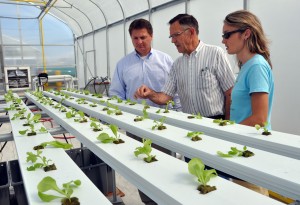 WOOSTER, Ohio — A new organic-based fertilizer for commercial hydroponic production can boost lettuce growth by about 13 percent, according to preliminary trials conducted by Ohio State University’s Ohio Agricultural Research and Development Center in Wooster.
WOOSTER, Ohio — A new organic-based fertilizer for commercial hydroponic production can boost lettuce growth by about 13 percent, according to preliminary trials conducted by Ohio State University’s Ohio Agricultural Research and Development Center in Wooster.
The fertilizer, BiOWiSH-Hydroponic, is produced by BiOWiSH Technologies, a Chicago-based manufacturer of natural food production and environmental remediation technologies.
What is it?
Available in the U.S. market for a little over a year and for two years internationally, the fertilizer is a unique blend of bacteria and biocatalysts that, according to company claims, helps speed up the breakdown of organic matter and potentially impacts plant processes, making nutrients more readily available or usable.
BiOWiSH Technologies sought out OARDC — the research arm of Ohio State’s College of Food, Agricultural and Environmental Sciences — to carry out independent, third-party testing of its product for the U.S.
Also involved in the trials is CropKing Inc., an Ohio-based company that serves the hydroponic produce industry and is a local distributor of BiOWiSH-Hydroponic.
“We had previously tested this technology at CropKing’s research greenhouse and experienced positive results of over 10 percent in the speed of lettuce growth, meaning a grower using our product could get one to two additional crops per year,” said Bill Diederich, senior executive vice president for agri-business at BiOWiSH Technologies.
“After that, our company began looking for a third party or university partner to test the results and refine some aspects of the product. That led us to Ohio State. Wooster is a good location, close to CropKing and also to BiOWiSH.”
Another link between the partners in this project is Natalie Bumgarner, a CropKing horticulturist and recent Ph.D. graduate from Ohio State’s Department of Horticulture and Crop Science. She works closely with Robert Hansen, an OARDC expert in hydroponic lettuce production who is running the trials for BiOWiSH Technologies.
“Our first round of experiments has verified what the company claims,” said Hansen, a research scientist in the Department of Food, Agricultural and Biological Engineering.
“We have seen a 13.4 percent advantage of one biocatalyst compared to a control without the biocatalyst. We used three different lettuce cultivars (varieties) and found almost identical results.”
Future plans
Funded by BiOWiSH Technologies, the project — which began in the summer — will continue for three years, involving some 15 different experiments. Some of the trials will look at the effect of various concentrations of the fertilizer, while others will focus on various flow rates — the rates at which the fertilizer is fed to the plants.
The goal, Diederich said, is to find the best possible combination of BiOWiSH-Hydroponic and grower management practices to increase production.
“During our collaboration, we will also conduct quality evaluations designed to quantify the numerous anecdotal claims that BiOWiSH-Hydroponic has a positive effect on the taste of lettuce,” he said.
Importance
For Paul Brentlinger, president of CropKing, this type of research is important for the development of the hydroponic industry in Ohio and elsewhere.
“Hydroponic is getting a lot of press these days as an emerging field,” he said. “Here we have three impressive organizations, which are leaders in their fields, putting energy, money and time to improve this industry.”
Hansen agrees.
“The ultimate goal of this project is to make Ohio more competitive so that the hydroponic industry can grow lettuce more efficiently and we don’t have to import it from Mexico or other places,” he said. “This also fits into the push for local foods and fresher, higher-quality produce.”











